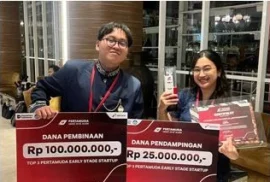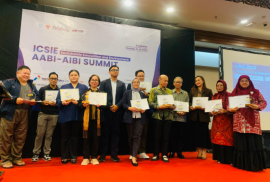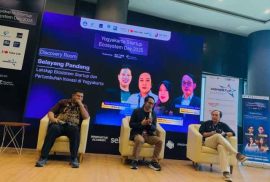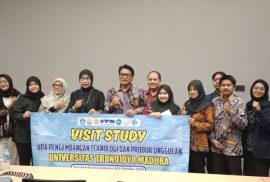
Yogyakarta, October 1, 2025 – Gadjah Mada University (UGM) and the National Research and Innovation Agency (BRIN) strengthened their commitment to enhancing research and commercialization of Indonesia’s tropical biodiversity through the signing of a strategic agreement at the workshop “Biodiversity Management and Strengthening Intellectual Property Rights for a Sustainable Future: UGM-BRIN Synergy.” The event, which took place at the UGM Senate Hall on Wednesday (1/10), was attended by the Chair of the BRIN Steering Committee, Prof. Dr. (H.C.) Hj. Megawati Soekarnoputri. UGM Rector Prof. dr. Ova Emilia, M.Med.Ed.,Sp.OG(K)., Ph.D. stated that this collaboration is a strategic step to strengthen the biodiversity research ecosystem. “The synergy between UGM and BRIN is expected to bring about innovations that have a real impact on Indonesia’s sustainable development,” she said.
Before the main event, Megawati Soekarnoputri planted a Bodhi tree (Ficus religiosa) in the courtyard of the UGM Balairung. Dean of the UGM Faculty of Forestry, Sigit Sunarta, explained that this tree was chosen for its deep philosophical meaning. “The Bodhi tree is a symbol of wisdom and tranquility, as well as a bridge between humans and nature,” explained Sigit. In her speech, Megawati Soekarnoputri emphasized the importance of nationalism in research development. “The younger generation must use their knowledge and abilities to keep Indonesia independent, sovereign, and eternal. Strengthening research must be accompanied by a commitment to protecting the environment,” she said.
Dr. Bambang Kesowo, S.H., LL.M., Member of the BRIN Steering Committee, emphasized in his keynote speech that the management of national biodiversity cannot be separated from strong IPR governance. Without clear legal protection, the results of research and Indonesia’s biological wealth will be vulnerable to exploitation by outside parties. “Strengthening intellectual property rights is an important foundation in maintaining the nation’s sovereignty over its rich biodiversity potential,” Bambang emphasized. Bambang also encouraged UGM to expand education and understanding of intellectual property rights not only in the law faculty, but also in other faculties, such as agro-complex, science, and socio-humanities.
The head of BRIN, Dr. Laksana Tri Handoko, said that research in the field of biodiversity needs to be directed not only at conservation but also at sustainable use that supports the food, pharmaceutical, renewable energy, and climate change mitigation sectors. According to him, collaboration with UGM is strategically important because it can bring about innovations that are relevant to the needs of industry and society, while strengthening Indonesia’s research network at the global level. “Research in the field of biodiversity needs to be directed not only at conservation, but also at sustainable use that supports the food, pharmaceutical, renewable energy, and climate change mitigation sectors,” he said.
This workshop marked the signing of a Memorandum of Understanding (MoU) between BRIN and UGM on the conservation and utilization of tropical biodiversity by the Vice Rector for Research, Business Development, and Cooperation at UGM, Dr. Danang Sri Hadmoko. In addition, a Cooperation Agreement (PKS) related to the management of intellectual property of biological resources was also signed by the Acting Director of Business Development at UGM, Prof. Ir. Sang Kompiang Wirawan, S.T., M.T., Ph.D. UGM has made significant achievements in the protection of biodiversity intellectual property rights. In 2024, UGM recorded 28 copyrights and 30 biodiversity patents, while in 2025 until September, 11 copyrights and 19 patents have been registered. This data shows UGM’s commitment to not only producing innovation but also strengthening legal protection for national biodiversity.
The workshop also featured a presentation on the Status and Trends of the Indonesian Biodiversity Index (IBI) by the Dean of the Faculty of Biology at UGM, Prof. Dr. Budi S. Daryono, M.Agr.Sc., as well as a display of UGM’s biodiversity downstream research results in a mini-expo showcasing various innovations from Indonesia’s tropical biodiversity. Through this workshop, UGM further solidifies its position as a center for tropical biodiversity research that not only contributes to the advancement of science but also provides tangible solutions for sustainable development in Indonesia.
